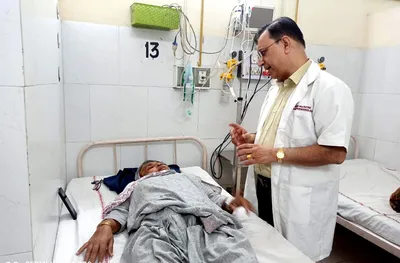Health
Over 800 Doctors Trained to Combat Hepatitis and Fatty Liver Disease

The state government has successfully trained over 800 doctors in India to enhance early detection and management of viral hepatitis and non-alcoholic fatty liver disease (NAFLD). This initiative aims to equip healthcare professionals in primary healthcare settings with the skills necessary to identify and treat these potentially life-threatening conditions effectively.
In the past year, doctors working at primary and community health centres, civil hospitals, and medical colleges have undergone specialized training. The program, guided by experts like Dr. Parveen Malhotra and Dr. Parveen Boora, focuses on identifying early symptoms of hepatitis B and C, allowing for timely intervention to prevent disease progression.
Viral hepatitis and NAFLD are significant public health concerns in India, with an estimated prevalence of 6 percent for hepatitis and a staggering 25 percent for NAFLD among the population. Under the national health programmes, these diseases are now prioritized for intervention, emphasizing the need for early diagnosis.
Training and Collaboration
Dr. Malhotra, a senior professor and head of the department of medical gastroenterology at PGIMS Rohtak, highlighted the urgency of equipping grassroots doctors with knowledge about hepatitis. “Given the high patient load, the goal is to manage uncomplicated cases locally and refer more complex ones to PGIMS,” he stated.
Training sessions have also reached doctors from other states, including Jammu & Kashmir, Karnataka, and the North-Eastern region of India, facilitated through the ECHO virtual platform. This collaborative effort seeks to build a network of healthcare providers capable of addressing these diseases proactively.
The second phase of the initiative has shifted focus towards NAFLD, featuring a virtual training program co-conducted by the Directorate General of Health Services, Haryana, PGIMS Rohtak, and ECHO India. Dr. Braham Deep Singh, Director of Health Services, emphasized the importance of this strategy in reducing the burden of non-communicable diseases in the state.
Impact and Future Directions
Dr. Ompal Singh Saini, Deputy Director, along with Dr. Gerish Atri, State Programme Officer, confirmed that 100 medical officers and 700 community health officers (CHOs) have benefited from this initiative so far. Their training aims to ensure early detection of NAFLD and appropriate interventions.
Dr. (Col) Kumud Rai, Chairman of ECHO India, and Dr. Sunil Anand, Executive Director, noted that ECHO India operates as a non-profit trust dedicated to empowering healthcare professionals through its tele-mentoring ‘Hub and Spoke’ model. This innovative approach not only enhances local healthcare capabilities but also fosters a collaborative environment for knowledge sharing across states.
As these training programs continue to evolve, they represent a critical step towards improving health outcomes for individuals affected by hepatitis and fatty liver diseases across India. The commitment to early detection and effective management reflects a broader effort to strengthen the healthcare system and address pressing public health challenges.
-

 World5 months ago
World5 months agoSBI Announces QIP Floor Price at ₹811.05 Per Share
-

 Lifestyle5 months ago
Lifestyle5 months agoCept Unveils ₹3.1 Crore Urban Mobility Plan for Sustainable Growth
-

 Science4 months ago
Science4 months agoNew Blood Group Discovered in South Indian Woman at Rotary Centre
-

 World5 months ago
World5 months agoTorrential Rains Cause Flash Flooding in New York and New Jersey
-

 Top Stories5 months ago
Top Stories5 months agoKonkani Cultural Organisation to Host Pearl Jubilee in Abu Dhabi
-

 Sports4 months ago
Sports4 months agoBroad Advocates for Bowling Change Ahead of Final Test Against India
-

 Science5 months ago
Science5 months agoNothing Headphone 1 Review: A Bold Contender in Audio Design
-

 Top Stories5 months ago
Top Stories5 months agoAir India Crash Investigation Highlights Boeing Fuel Switch Concerns
-

 Business5 months ago
Business5 months agoIndian Stock Market Rebounds: Sensex and Nifty Rise After Four-Day Decline
-

 Sports4 months ago
Sports4 months agoCristian Totti Retires at 19: Pressure of Fame Takes Toll
-

 Politics5 months ago
Politics5 months agoAbandoned Doberman Finds New Home After Journey to Prague
-

 Top Stories5 months ago
Top Stories5 months agoPatna Bank Manager Abhishek Varun Found Dead in Well









